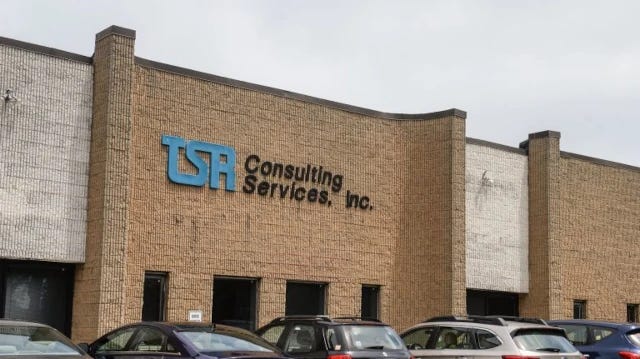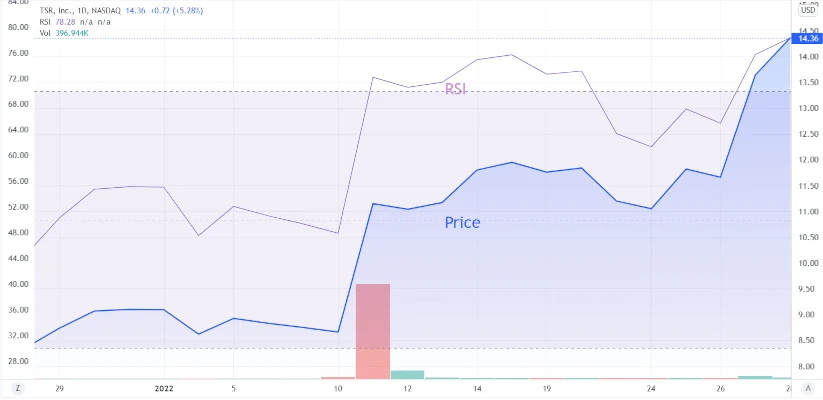Shares of TSR, Inc. Soar while Company Has ATM Offering
Dilution will put pressure on stock price as newly issued shares hit the market
While the major indices have nosedived, shares of TSR, Inc. (TSRI 0.00%↑) have climbed 58% year-to-date to close at $14.36 today. We believe the higher this stock soars, the further it will fall.
As of today’s close, TSRI’s 14-day relative strength index (RSI) was 78.28, indicating overbought conditions amid a broad market sell-off. Moreover, the stock’s daily closing price has begun increasing at a faster rate than its RSI. If the price and the RSI diverge, a reversal in price action may be imminent.
TSR was founded in 1969 and provides computer programmers who perform contract services for large corporations and government agencies. As a staffing agency, the company’s profit margins are wafer thin compared to those of companies that sell software products. In the fiscal year ended May 31, 2021, TSR earned 16% gross margin on net revenues of $68,821,217. The company’s net loss for the year was $577,085 and would have been $600,974 if not for TSR’s $3,100,000 acquisition of Geneva Consulting Group, Inc. in Sep. 2020, which added $8,805,000 to the company’s consolidated top line.
Cash on Tap
As of Nov. 30, 2021, TSR had $6,267,810 in cash and equivalents, a decrease of $1,102,836, or 15%, from May 31, 2021. The company has a $2,000,000 revolving credit facility against which it had borrowed $44,000 as of Nov. 30, 2021. But with the recent run-up in its stock price, TSR is more likely to raise capital by issuing and selling shares in a $4,167,000 at-the-market (ATM) offering the SEC declared effective in Oct. 2021.
TSR’s ATM agreement with broker-dealer A.G.P./Alliance Global Partners allows the issuer to sell newly minted shares through or to A.G.P. at market prices from time to time until a total of $4,167,000 of common stock has been sold. As is customary, the agreement gives TSR broad discretion over the number of shares to be sold, the minimum market price, the time period in which to sell the shares, and the maximum number of shares to sell per day. That is, TSR can carefully control how the issuance and sale of new shares affects its stock price.
TSR has an incentive to sell shares in the ATM offering at the highest price possible not because doing so will raise more capital but because it will minimize the number of shares issued. As of Jan. 7, 2022, the company had a public float of approximately 955,188 shares out of 1,962,062 common shares outstanding. At the 52-week low of $7.63 per share, the company would have to issue 546,134 shares to raise $4,167,000, which would increase the public float by 57%. But at the 52-week high of $13.64, which the stock reached yesterday, the company would have to issue only 305,499 shares, which would increase the public float by 32%.
Either outcome would result in significant dilution for shareholders. Since the shares to be issued in the ATM offering have been duly registered with the SEC, A.G.P. or its customers can resell them immediately, which will put downward pressure on the stock’s market price. What’s more, the SEC has approved an additional shelf registration for $5,000,000 of TSR’s common shares. Therefore, the company has the option to issue and sell more dilutive shares on demand for the next three years.
Litigation Risks
TSR has arranged its financing over the past three years against a backdrop of intense litigation. In Jul. 2018, the company’s founder, Joseph Hughes, and his wife, Winifred Hughes, agreed to sell their 42% controlling interest in TSR to Zeff Capital, L.P., QAR Industries, Inc., and Fintech Consulting, LLC. The sale touched off a series of disputes.
Shortly after the sale, TSR’s board of directors adopted a shareholder rights plan, which included a poison pill anti-takeover provision and an expansion of the board from five to seven members with staggered terms. In response, Zeff Capital launched a proxy contest, nominating two candidates to serve on TSR’s board. TSR, in turn, postponed the 2018 annual meeting of shareholders and sued Zeff Capital, QAR Industries, and Fintech Consulting in federal court. TSR’s complaint alleged that the defendants had engaged in a secret campaign to seize control of the company without completely and accurately disclosing their intentions to TSR’s shareholders.
In Aug. 2019, TSR and the defendants reached a settlement agreement in which the company agreed to hold its annual meeting and elect directors. The meeting occurred in Oct. 2019, and Zeff Capital’s two nominees, Timothy Eriksen and Bradley Tirpak, were elected. Concurrent with the settlement agreement, Zeff Capital, QAR Industries, and Fintech Capital agreed to sell their combined stake in TSR for $1,500,000 to the company and Christopher Hughes, who had succeeded his father, Joseph Hughes, as CEO of TSR in 2017. But TSR and Hughes did not complete the purchase by the deadline of Dec. 30, 2019.
Pursuant to the settlement agreement, all of TSR’s directors except the two nominated by Zeff Capital resigned from the company’s board after TSR and Hughes failed to complete the purchase. The two remaining directors appointed Robert Fitzgerald, CEO of QAR Industries, to the board. Thus Zeff Capital and QAR Industries gained control of TSR’s board and, along with Fintech Consulting, retained their combined majority ownership stake in the company.
The board fired Christopher Hughes as CEO in Feb. 2020. Hughes sued TSR in the Supreme Court of the State of New York in Mar. 2020. His complaint alleged that his termination was a breach of his employment agreement, and he sought $1,000,000 in severance pay. In Oct. 2021, Hughes and TSR reached a settlement in which the company agreed to pay him $705,000.
In Nov. 2021, Fintech Consulting sued TSR, QAR Industries, Fitzgerald, and Tirpak in federal court. Fintech’s complaint alleges that on Feb. 1, 2021, Fitzgerald induced Fintech to sell its 376,000 shares of TSR to QAR Industries and Tirpak for $7.25 per share without disclosing to Fintech that three days before, five officers and directors of TSR had exercised options to buy common shares of TSR. The options exercises were publicly disclosed in SEC Form 4 filings on the same day Fintech executed the share purchase agreement with QAR Industries and Tirpak. From Feb. 1 through Feb. 5, 2021, the closing price of TSR’s stock rose from $8.59 to $12.88 as the market interpreted the insider purchases as positive signals. Fintech’s complaint alleges that by not telling Fintech about the options exercises, Fitzgerald secured the company’s TSR shares at a discount. The case is pending.
In the six months ended Nov. 30, 2021, TSR paid $284,144 in legal settlement expenses. As of Nov. 30, 2021, the company had $582,965 of legal settlement liabilities payable within the next 12 months. With such payments coming due and additional litigation pending, legal expenses will continue to consume TSR’s cash and may drive the company to seek additional sources of financing–including sales of newly issued shares.
This story appeared originally on The Activist.





